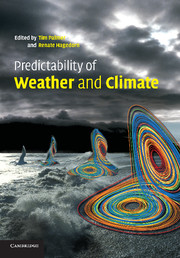Book contents
- Frontmatter
- Contents
- List of contributors
- Preface
- Chapter 1 Predictability of weather and climate: from theory to practice
- Chapter 2 Predictability from a dynamical meteorological perspective
- Chapter 3 Predictability – a problem partly solved
- Chapter 4 The Liouville equation and atmospheric predictability
- Chapter 5 Application of generalised stability theory to deterministic and statistical prediction
- Chapter 6 Ensemble-based atmospheric data assimilation
- Chapter 7 Ensemble forecasting and data assimilation: two problems with the same solution?
- Chapter 8 Approximating optimal state estimation
- Chapter 9 Predictability past, predictability present
- Chapter 10 Predictability of coupled processes
- Chapter 11 Predictability of tropical intraseasonal variability
- Chapter 12 Predictability of seasonal climate variations: a pedagogical review
- Chapter 13 Predictability of the North Atlantic thermohaline circulation
- Chapter 14 On the predictability of flow-regime properties on interannual to interdecadal timescales
- Chapter 15 Model error in weather and climate forecasting
- Chapter 16 Observations, assimilation and the improvement of global weather prediction – some results from operational forecasting and ERA-40
- Chapter 17 The ECMWF Ensemble Prediction System
- Chapter 18 Limited-area ensemble forecasting: the COSMO-LEPS system
- Chapter 19 Operational seasonal prediction
- Chapter 20 Weather and seasonal climate forecasts using the superensemble approach
- Chapter 21 Predictability and targeted observations
- Chapter 22 The attributes of forecast systems: a general framework for the evaluation and calibration of weather forecasts
- Chapter 23 Predictability from a forecast provider's perspective
- Chapter 24 Ensemble forecasts: can they provide useful early warnings?
- Chapter 25 Predictability and economic value
- Chapter 26 A three-tier overlapping prediction scheme: tools for strategic and tactical decisions in the developing world
- Chapter 27 DEMETER and the application of seasonal forecasts
- Index
- Plate section
- References
Chapter 13 - Predictability of the North Atlantic thermohaline circulation
Published online by Cambridge University Press: 03 December 2009
- Frontmatter
- Contents
- List of contributors
- Preface
- Chapter 1 Predictability of weather and climate: from theory to practice
- Chapter 2 Predictability from a dynamical meteorological perspective
- Chapter 3 Predictability – a problem partly solved
- Chapter 4 The Liouville equation and atmospheric predictability
- Chapter 5 Application of generalised stability theory to deterministic and statistical prediction
- Chapter 6 Ensemble-based atmospheric data assimilation
- Chapter 7 Ensemble forecasting and data assimilation: two problems with the same solution?
- Chapter 8 Approximating optimal state estimation
- Chapter 9 Predictability past, predictability present
- Chapter 10 Predictability of coupled processes
- Chapter 11 Predictability of tropical intraseasonal variability
- Chapter 12 Predictability of seasonal climate variations: a pedagogical review
- Chapter 13 Predictability of the North Atlantic thermohaline circulation
- Chapter 14 On the predictability of flow-regime properties on interannual to interdecadal timescales
- Chapter 15 Model error in weather and climate forecasting
- Chapter 16 Observations, assimilation and the improvement of global weather prediction – some results from operational forecasting and ERA-40
- Chapter 17 The ECMWF Ensemble Prediction System
- Chapter 18 Limited-area ensemble forecasting: the COSMO-LEPS system
- Chapter 19 Operational seasonal prediction
- Chapter 20 Weather and seasonal climate forecasts using the superensemble approach
- Chapter 21 Predictability and targeted observations
- Chapter 22 The attributes of forecast systems: a general framework for the evaluation and calibration of weather forecasts
- Chapter 23 Predictability from a forecast provider's perspective
- Chapter 24 Ensemble forecasts: can they provide useful early warnings?
- Chapter 25 Predictability and economic value
- Chapter 26 A three-tier overlapping prediction scheme: tools for strategic and tactical decisions in the developing world
- Chapter 27 DEMETER and the application of seasonal forecasts
- Index
- Plate section
- References
Summary
Sea surface temperature (SST) observations in the North Atlantic indicate the existence of strong multi-decadal variability with unique spatial structure. It is shown by means of a global climate model which does not employ flux adjustments that the multidecadal SST variability is closely related to variations in the North Atlantic thermohaline circulation (THC). The close correspondence between the North Atlantic SST and THC variabilities allows, in conjunction with the dynamical inertia of the THC, for the prediction of the slowly varying component of the North Atlantic climate system. This is shown by classical predictability experiments and greenhouse warming simulations with the global climate model.
Introduction
The North Atlantic thermohaline circulation is an important component of the global climate system. Strong and rapid changes in the THC have been reported from palaeo-climatic records (e.g. Broecker et al., 1985), and a current topic for discussion is whether greenhouse warming may have a serious impact on the stability of THC (e.g. Cubasch et al., 2001). The North Atlantic SST varied on a wide range of timescales during the last century (e.g. Deser and Blackmon, 1993). It has been pointed out (Bjerknes, 1964) that the short-term interannual variations are driven primarily by the atmosphere, while the long-term multidecadal changes may be forced by variations in ocean dynamics. The latter is supported by simulations with coupled ocean–atmosphere models (Delworth et al., 1993; Timmermann et al., 1998; Park and Latif, 2005) which show that variations in the North Atlantic THC are reflected in large-scale SST anomalies.
Information
- Type
- Chapter
- Information
- Predictability of Weather and Climate , pp. 342 - 364Publisher: Cambridge University PressPrint publication year: 2006
References
Accessibility standard: Unknown
Why this information is here
This section outlines the accessibility features of this content - including support for screen readers, full keyboard navigation and high-contrast display options. This may not be relevant for you.Accessibility Information
- 1
- Cited by
